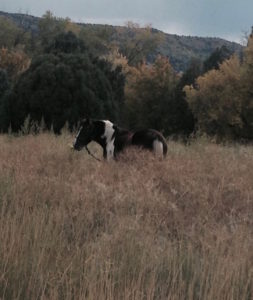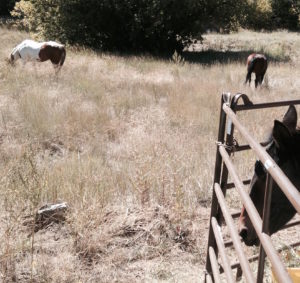Last month, I camped with horses on Bureau of Land Management land. I wanted to experiment with something Mark Rashid mentioned at his recent clinic. To paraphrase, he said that wild horse herd leaders are true leaders, defending the herd and leading it to food sources and away from danger. Domestic leaders are more paradoxical. They tend to be insecure, food-focused bullies – just the opposite of true leaders.
How would this play out in my camping scenario?

Pep wanders far afield
On Day One, I brought three horses. I kept two in a small enclosure and let Pep, who is lower in herd order than the other two, graze outside the enclosure.
Result: Pep wandered far and seemed far less interested in her whinny-ing penned companions than they were in her.
On Day Two, I brought four horses. I kept two in the small enclosure and let the two leaders, Brooke and Jodi, graze outside the enclosure.
Result: Sure enough, Brooke and Jodi were not interested in straying. They seemed insecure about their surroundings and chose to stay close to the enclosure.
Was this leadership (protecting herd members) or insecurity?

Top mares, Brooke and Jodi, stay close to their penned herd mates.
Rashid says that domestic herd leaders lack a certain sense of self. Their identity is all about who they are in the herd. That’s why they tend to be more ‘barn sour’ than other horses down the herd ladder.
Based on what I’ve seen and experienced with my own horses, I tend to agree.
Another side effect? It’s no surprise, too, that the lower ranking horses are much more enjoyable to ride. They enjoy getting out far more than their “leaders.”
I agree if the domestic herd has not been properly lined out with the herd order there can be quite a difference in the alpha order. I have found with my herd that I can send the alpha mare out to the “bully” horse or young learning horse and tell her to move him out. she will do that and wait for an apology from the misbehaving individual.
If I do not have an alpha mare to direct, then I become the alpha and direct the misbehaving horse out of the herd.
Bottom line, the herd needs an alpha to direct them and inform them of the rules of the herd. Just like school children needing a teacher. This occurs with the wild horses. If they do not have an alpha, one will be brought in or one will take the point.
They want to know where they fit in within the herd and need the direction.
Be the herd leader and appoint a herd leader or there will be one to take the roll of “bully” because , they can.
Patricia
Spirit Rock Morgan
Equine Education
I agree if the domestic herd has not been properly lined out with the herd order there can be quite a difference in the alpha order. I have found with my herd that I can send the alpha mare out to the “bully” horse or young learning horse and tell her to move him out. she will do that and wait for an apology from the misbehaving individual.